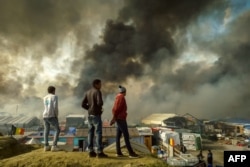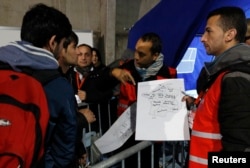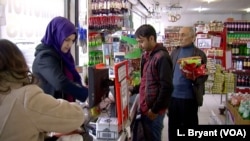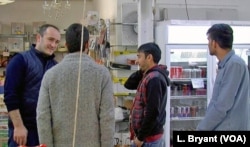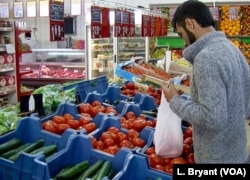Their days are still spent hunched over phones, playing video games and chatting to friends on WhatsApp. But life has changed dramatically for the nearly half-dozen Afghan migrants who arrived here last week from the muddy squalor of the so-called "Jungle" camp near the northern port city of Calais.
Instead of rain-soaked tents, they now share small rooms with showers in a peeling motel abutting a highway 275 kilometers to the southeast. Dreams of Britain have shifted to the possibility of a future in France.
“We have to learn French and build a life here,” said 28-year-old father of four Saber Sha, a former army truck driver from eastern Nangarhar Province. “I want to bring my family here, because it’s not safe to stay in Afghanistan.”
The young men count among more than 5,000 migrants evacuated from the Calais camp and dispatched to towns and cities around France. On Monday, bulldozers are expected to finish demolishing the wood-and-tarp shanty town just across the Channel from Dover, but France’s larger migrant problem is far from over.
Some 1,500 unaccompanied children remain in the Calais, as France and Britain squabble about their future. Other migrants have resettled under the French government plan, but many dream of returning to port city, their sights set on Britain.
A European problem
Hundreds also have headed to Paris, charities say, where makeshift tent camps have swelled dramatically in recent days. The government vows to demolish them this week, underscoring the shifting and durable nature of France’s migrant problem that has become symbolic of Europe’s unresolved crisis.
Reims, the historic heart of France’s Champagne region, took in 29 Afghans and Sudanese from the Jungle. Local officials greeted the bedraggled group with cakes and hot coffee as they arrived by bus last Tuesday.
“We wanted to show we’re happy to receive them,” said Philippe Wattier, director of the Salvation Army in Reims. The charity has been asked to help the migrants settle in and apply for asylum — a step Wattier says, all want to take.
“Until now, the image they’ve had of [the] French has been of people who have mistreated them, the police they’ve clashed with, the misunderstandings,” he added. “It will take some time to build relationships.”
Months in Calais have left other scars. Three of the migrants have been hospitalized for possible tuberculosis. Others have scabies, lice and parasites.
On Friday, several Afghans ventured out for the first time, stocking up on canned meat and vegetables at a Halal supermarket. They chatted with the Turkish staff in a language learned from months in Turkey awaiting passage to Europe.
Haunting memories
Abdul Wahid Niazi is still haunted by memories of the crossing to Greece on a rubber dinghy designed for five, but holding 25 instead.
“The boat in front of us capsized,” he recalled. “People were shouting, screaming. It was dark, so nobody could help them.”
Ten, wearing life jackets, were rescued the next day, but 16 drowned, he said. His own boat made the crossing intact.
Niazi eventually made it to London, but fled a few years later when he faced expulsion. He spent time in Italy before heading to Calais, hoping to make another try for Britain.
But today, he said, he has no regrets about leaving the Jungle.
“Gangsters went to tents at night and stole phones and money. I’ve seen people stabbed,” he said. The Afghans stayed safe, because they pitched their tents near one another. “We couldn’t complain to the police because they didn’t care.”
A friendly welcome
Coming to Reims was “like a shock,” he added. “The people are very good, friendly. We have food. I’ve never seen that here before.”
Throughout France, the Calais migrants have received a mixed welcome. Towns have been rocked by pro- and anti-migrant protests. Right wing mayors launched a campaign against taking them in.
In Reims, tourists flock to sip champagne and visit the city’s soaring cathedral where past kings of France were crowned. Residents have been calling charities to donate clothes for the migrants and volunteer their services.
“As long as they don’t make trouble, I think we should welcome them,” said 21-year-old arts student Julien Vallée. “I think it’s good to dispatch them around the country and integrate them.”
Yet others have been hostile. A letter to the Salvation Army last week threatened to torch establishments sheltering the migrants.
“It said they were sick of us welcoming these no goods, these foreigners,” Director Wattier said. “These xenophobic, hostile attitudes fit into the current climate in Europe — and also in the United States.”
He believes many of the new arrivals will have a good chance of receiving asylum. But the charity will prepare those who don’t for the bad news.
“We have to be pragmatic,” Wattier says. “We’re not selling dreams.”






